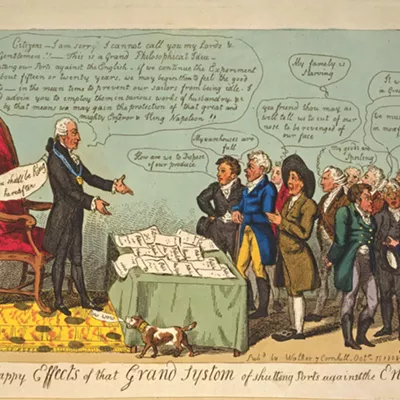
In 1905, college sports were in a state of crisis. Although wildly popular, with crowds rivaling professional baseball, college football was being played in a brutal and often deadly fashion. Players wore no safety equipment, and the most common strategy involved forming a "flying wedge" and battering head-to-head down the field. In that year alone, 19 student athletes died on the field from injuries.
Public outrage was intense. So grave was the situation that schools like Columbia and Duke dropped their football programs, while others switched to rugby. Harvard's president described the sport as "more brutalizing than cockfighting" and was on the cusp of cutting the nation's highest profile team.
Everyone knew the sport had to change course to survive, but individual colleges and stubborn coaches were too busy bickering and seeking self-advantage to find solutions.
Against this backdrop President Teddy Roosevelt, who felt college football was essential to building the character of not just students but also the country, exerted his leadership. Roosevelt called a summit of leading schools to attempt to create a series of reforms. "College football is on trial," he warned.
Roosevelt's goal was to keep the physical and competitive essence of football while making it safer. In addition to his stature as the leader of the nation, Roosevelt had the added leverage of being able to directly influence the coach of the U.S. Naval Academy — who fielded one of the country's best teams — into accepting proposed rule changes.
Roosevelt's efforts worked. A regulatory oversight body was established to increase competitiveness and introduce new rules like the forward pass in order to improve safety.
Political leadership had saved college football from itself.
Nearly a hundred years later, college sports is in a different kind of crisis — TV contract-induced conference realignment. Notably this includes the University of Washington and the University of Oregon, which cut multimillion-dollar deals with Fox Sports Corporation to follow University of Southern California and UCLA when they depart the regional Pac-12 Conference for the multiregional Big Ten conference next year.
Athletes are not dying by the dozen on the field like they were in Roosevelt's day, but financial greed will soon be sending "student" athletes regularly flying across three time zones for league games in not just football but all men's and women's sports. How exactly does a volleyball player make her evening chemistry lab if she's on a weeklong road trip from Seattle to Maryland and New Jersey?
Indeed, the academic, physical and mental health impacts on student athletes will be severe. But the damage does not stop there. The absurdity of nationwide conference realignment risks destroying the regional rivalries that make college sport great, leaving economic and academic carnage in its wake. A century of shared history and tradition have been abandoned as six other teams prepare to leave the Pac-12 in 2024. With Arizona, Arizona State, Colorado and Utah departing to play in the Big 12, and Stanford and Cal leaving for the Atlantic Coast Conference, only Washington State and Oregon State will remain in the Pac-12 Conference.
Why should the public care? First and foremost, because these are public universities owned by taxpayers. Conference affiliation and college sports success have significant impacts on the wider campus. As former Washington State University President Elson Floyd once told me, "The college sports arms race is out of control, but the fact remains that the success of a university's football team is directly correlated to how many students apply to go there, and how good the basketball team correlates to the quality of applicant's SAT scores."
The moves by UW and Oregon will also significantly hurt the local economies around college towns like Pullman and Corvallis. As current Oregon State University President Jayathi Murthy recently wrote, "Our surrounding community and the State of Oregon will absorb millions more in losses than the University of Oregon will collect from their move to the Big Ten Conference. The net negative impact on Oregon students, families and small businesses will be real."
Frustrating, then, that the decisions for UW and Oregon to leave the Pac-12 were made via backroom negotiations with TV executives rather than in public by elected officials who can make decisions for the good of the entire state and be directly accountable to taxpayers and voters.
There is a courtroom drama playing out to determine who controls what remains of the corpse of the Pac-12 Conference, but college sports today desperately needs the same kind of elected public leadership that President Roosevelt showed a century ago. Senators and governors are far more important than judges if sustainable competitive balance, academic focus and basic sanity are to be restored to college athletics.
It is possible. Here in Washington, we have shown that elected leaders can do big things for higher education when they want to. When I was the vice chair of the Senate Higher Education Committee, I worked with a dedicated group of bipartisan legislators to create two medical schools in Spokane and reduce the cost of public college tuition by 20%. Now we need another bipartisan cohort, at both the local and national level, to step forward to fix college athletics.
If not Roosevelt, then perhaps Europe can serve as a guide. Three years ago, the continent's biggest soccer clubs announced plans to form a new corporate TV driven "Super League." The biggest teams would make billions, but smaller clubs would be left to wither. Fortunately, the backlash was intense. Grassroots protests erupted to save soccer's local traditions. The politicians listened. The Super League was stopped. Small clubs and local communities were protected. Greed lost. Sanity prevailed. ♦
Michael Baumgartner was a Republican Washington state senator from 2011 to 2019, when he was elected to his current position as treasurer of Spokane County.



















